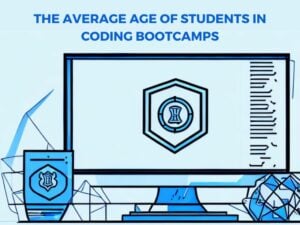Learning to code and becoming a proficient software developer can take years of study and practice.
However, there is a popular alternative to traditional computer science degrees that can help you kickstart your programming career in just a few months: coding bootcamps.
But how difficult are they to pass?
In this article, we’ll break down the structure of coding bootcamps, discuss the factors that determine their difficulty, provide strategies for success, and explore how to measure success in a coding bootcamp.
Understanding the structure of a coding bootcamp
Coding bootcamps are designed to be short, intensive programs that teach students the coding skills needed to get a job as a software developer.
They typically range from 12 to 24 weeks and require full-time attendance.
Bootcamps usually teach a variety of programming languages with a project-based learning approach: students work on real-world projects throughout the curriculum.
Duration and intensity of bootcamps
The length and intensity of coding bootcamps can vary depending on the program you choose.
Most bootcamps are full-time, meaning you will be learning and working on projects for at least eight hours per day, five days a week.
Some programs may also have evening or part-time options, but these programs often take longer.
It’s essential to note that the intensity of a coding bootcamp can be challenging for some students.
The fast-paced learning environment requires a lot of dedication and hard work. However, many bootcamps offer support resources such as tutoring, career services, and mentorship to help students succeed.
Project-based learning approach
Project-based learning is a key component of most coding bootcamps.
This approach encourages students to learn by doing rather than just reading or watching lectures.
Students typically work on real-world projects throughout the curriculum, individually, in pairs, or in teams.
This approach replicates the work students will be doing on the job, giving them practical experience and an opportunity to build their portfolio.
Working on projects also helps students develop important skills such as problem-solving, collaboration, and communication.
In addition, many bootcamps partner with companies to provide students with opportunities to work on real-world projects and gain experience working in a professional setting.
Coding bootcamps can be a great way to jumpstart your career in software development.
They offer a fast-paced, immersive learning experience that can help you build the skills you need to succeed in the tech industry.
However, it’s essential to research and choose a bootcamp that aligns with your goals and interests.
Factors that determine the difficulty of passing a coding bootcamp
While coding bootcamps aim to make learning to code more accessible, they are still challenging programs requiring significant time and effort.
Several factors can affect the difficulty of a coding bootcamp, including:
Prior coding experience
Your prior coding experience can significantly affect the difficulty of passing a coding bootcamp.
If you have no coding experience, you may find the bootcamp more challenging than someone who has taken a few programming classes or worked on projects in their spare time.
However, many bootcamps accept students of all ages with no prior coding experience and offer introductory courses to help ramp up students’ knowledge.
It’s important to note that prior coding experience doesn’t always guarantee success in a coding bootcamp.
Even experienced programmers may need help with the fast-paced nature of bootcamps or learn new programming languages and frameworks.
Time commitment and dedication
Coding bootcamps require a significant time commitment, as most programs are designed to be completed full-time over several weeks or months.
Additionally, success in a coding bootcamp requires dedication and hard work. You’ll need to be willing to put in the time and effort required to learn new programming concepts, work on projects, and collaborate with your peers.
It’s essential to have a realistic understanding of the time commitment required for a coding bootcamp.
Many students put other commitments on hold while in the bootcamp, such as work or social activities.
However, the payoff can be significant, as many bootcamps have high job placement rates and can lead to lucrative careers in tech.
Learning style compatibility
Everyone has a unique learning style, and coding bootcamps may not be the right fit for everyone.
Some people may struggle with the fast-paced, intensive nature of bootcamps, while others may thrive in this type of environment.
Additionally, some bootcamps may rely heavily on lectures and presentations, while others may use a more hands-on approach.
Researching different bootcamps and their teaching styles is important before committing to a program.
Many bootcamps offer free introductory courses or information sessions to help potential students understand the program’s teaching style and pace.
Quality of the bootcamp curriculum and instructors
The quality of the bootcamp curriculum and instructors can also affect the difficulty of passing a coding bootcamp.
A well-designed curriculum focusing on practical skills and real-world projects can make learning to code easier and more engaging.
Additionally, experienced and knowledgeable instructors can provide valuable guidance and support throughout the program.
When researching bootcamps, it’s important to look at the curriculum and the qualifications of the instructors.
Many bootcamps provide information about their instructors’ backgrounds and experience on their website, and some may offer student reviews or testimonials.
It’s also essential to consider the reputation of the bootcamp and its job placement rates.
A bootcamp with a strong track record of placing graduates in tech jobs may be worth the investment, even if it’s more challenging than other programs.
Strategies for success in a coding bootcamp
If you’re considering attending a coding bootcamp, there are several strategies you can use to increase your chances of success.
Attending a bootcamp can be an intensive and challenging experience, but with the right approach, you can come out on top and launch your career in tech.
Here are some tips to help you succeed:
Developing a strong foundation in programming basics
Before attending a coding bootcamp, developing a basic understanding of programming concepts and syntax can be helpful.
This will give you a head start and make it easier to keep up with the curriculum. You can do this by taking free online courses or tutorials or working on personal programming projects.
Some popular resources for learning programming basics include Codecademy and FreeCodeCamp.
When working on personal projects, try to challenge yourself and tackle problems that you find interesting.
This will help you build your problem-solving skills and develop a deeper understanding of programming concepts. You can also use online forums and communities to get feedback on your projects and ask for help when you’re stuck.
Time management and organization
Managing your time effectively and staying organized throughout the bootcamp can help you stay on track and avoid falling behind.
Bootcamps are often fast-paced and require much work outside of class, so it’s important to plan how you’ll manage your time.
Take advantage of time-management tools like calendars, to-do lists, and project management software to help you stay focused and productive.
It can also be helpful to set goals for yourself and break down larger projects into smaller, more manageable tasks. This will help you stay motivated and avoid feeling overwhelmed.
Remember to take breaks when needed, and give yourself time to recharge!
Seeking help and collaborating with peers
Collaborating with peers and seeking help from instructors or mentors can also help you succeed in a coding bootcamp.
You can work together on projects, practice coding together, and provide feedback to each other. This can help you learn from others and develop new approaches to problem-solving.
Additionally, asking for help when you’re struggling can prevent you from falling behind and help you stay on track.
Don’t be afraid to reach out to your instructors or classmates if you’re having trouble with a concept or project.
Bootcamps are designed to be intensive and challenging, so needing help along the way is normal.
Practicing problem-solving and critical thinking skills
Problem-solving and critical thinking skills are essential for success in coding bootcamps.
You’ll need to be able to break down complex problems into smaller, more manageable pieces and come up with creative solutions to programming challenges.
Practicing problem-solving and critical thinking skills before attending a bootcamp can help you feel more confident and prepared.
You can practice these skills by working on coding challenges and puzzles, participating in coding competitions, or playing strategy games.
These activities can help you develop your ability to think critically and creatively, which will be valuable in your career as a programmer.
Following these tips can increase your chances of success in a coding bootcamp.
Remember to stay focused, stay motivated, and don’t be afraid to ask for help when you need it. With hard work and dedication, you can launch your career in tech and achieve your goals!
Measuring success in a coding bootcamp
There are several ways to measure success in a coding bootcamp:
Assessments and evaluations
The bootcamp may provide assessments and evaluations throughout the program to help you gauge your progress and identify areas for improvement.
These can include quizzes, exams, and coding challenges.
Portfolio development and project completion
Completing projects and building a portfolio of your work can be an excellent way to measure your success in a coding bootcamp.
Your portfolio can showcase the skills you’ve learned and the projects you’ve worked on, and it can be a huge asset when applying for jobs.
Job placement and career support
The ultimate measure of success in a coding bootcamp is your ability to land a job as a software developer.
Many bootcamps offer job placement assistance and career support, including resume building, networking events, and mock interviews.
Use these resources to increase your chances of getting hired.
Conclusion
Coding bootcamps offer a fast and intensive way to learn programming skills and start a career as a software developer.
While they can be challenging, with the right strategies and mindset, anyone can successfully complete a coding bootcamp.
By understanding the structure of coding bootcamps, the factors that determine their difficulty, and using strategies for success like time management and seeking help, you can measure your success through assessments and evaluations, portfolio development, and job placement.
Whether you have prior coding experience or are just starting, coding bootcamps can be a valuable investment in your career and future success as a software developer.





